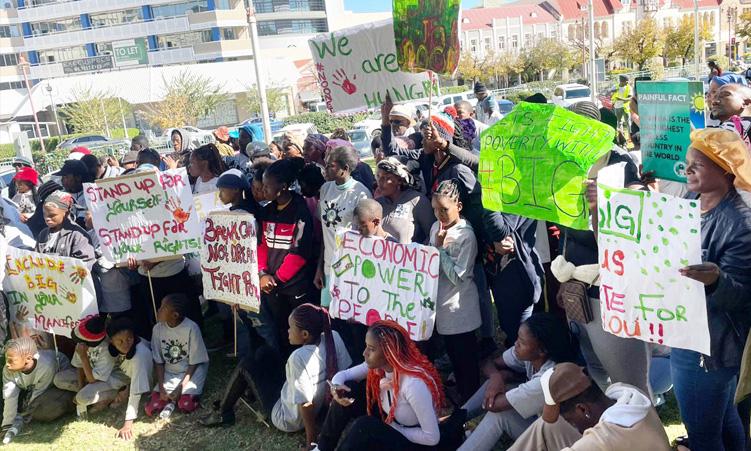The Basic Income Grant (BIG) Coalition of Namibia protested against the government’s proposed basic income grant on Saturday.
They say the grant excludes the majority of the population. This comes after the Ministry of Gender Equality, Child Welfare and Poverty Eradication began registering qualifying households countrywide for the conditional BIG of N$600 last week.
BIG Coalition coordinator Rinaani Musutua says the government has not made an effort to collaborate with the organisation despite their advocacy for a universal and unconditional BIG for people for the past 19 years.
“We are not happy with what the government is doing right now: excluding a lot of people in the country who are not eligible for that Haraambe cash grant,” she said.
Musutua says the government should work with the organisation to find a solution to widespread poverty after Namibia was named a hunger hotspot by the United Nation’s agencies this month.
She also alleges that the government’s conversion of the food bank into a ‘Haraambee cash grant’ was an intentional move to derail the organisation’s campaign, which has demanded a BIG of N$500 per person for Namibians aged 0-59 years.
“You don’t set conditions on a basic income grant, because the basic income grant is unconditional. As soon as you set conditions on it, find another name for it,” she added.
Musutua further alleged the coalition has been doing the government’s job addressing the public’s concerns regarding eligibility for the conditional grant that has been extended to more towns.
The ministry is rolling out the conditional BIG as part of the transition from the food bank programme and the marginalised communities special feeding programme.
“We will continue to make it clear that what we campaign for is completely different from what the government is busy with right now or trying to implement,” she said.
“[This gathering] is an information session to explain to the public what exactly is going on now, because the public doesn’t really know,” she said.
The gender ministry’s executive director, Ndiitah Nghipondoka-Robiati, said the ministry has actively engaged various stakeholders, non-governmental organisations and local leaders to address poverty and hunger in Namibia.
“While there may have been challenges in achieving a fully unified approach, the ministry recognises the importance of collaboration and is committed to enhancing stakeholder engagement as we move forward,” she said.
Nghipondoka-Robiati noted that the ministry implemented the conditional Basic Income Grant (CBIG), which is an extension of the former food bank programme designed for vulnerable and destitute households in urban and peri-urban areas.
To qualify, households must meet specific criteria, including household income levels below N$1 600, unemployment status or lack of access to other forms of support.
She further said the ministry employed a verification system to confirm eligibility by cross-referencing information with the National Population Register and the Social Security Commission database.
“This process ensures that only eligible households receive support while preventing fraud and maintaining accurate records,” she said.
Some citizens may not qualify for the CBIG due to its specific eligibility criteria. The ministry is actively working to educate the public about these distinctions through media campaigns, community outreach and information sessions, she said.
“The ministry is exploring options and modalities for expanding support services and considering alternative assistance programmes that may cater for those who fall outside the current eligibility provision framework,” she added










